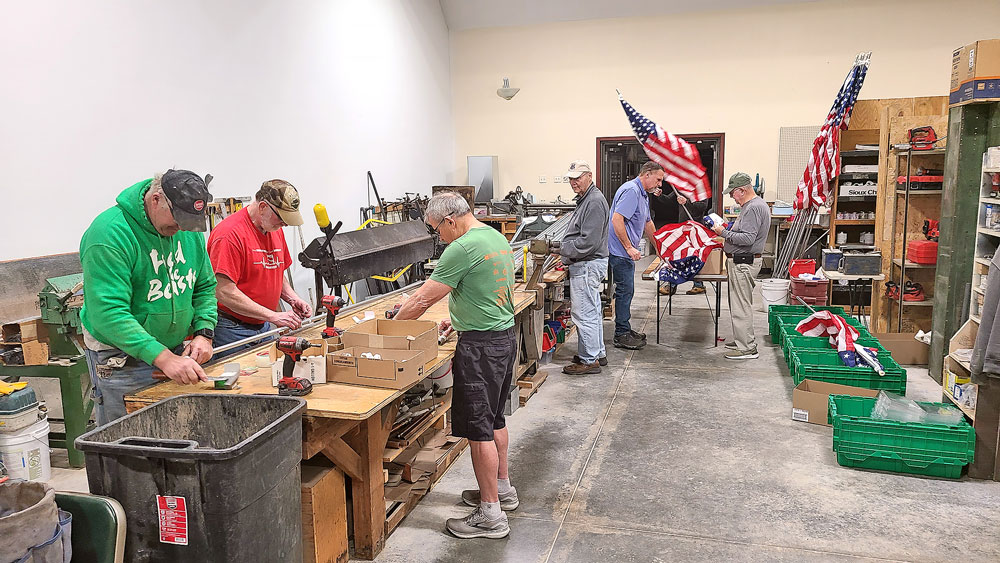City Council tables talk once again concerning paved parking requirements

By Kelly Terpstra, kterpstra@charlescitypress.com
The discussion was lengthy, but in the end the issue was once again tabled regarding paved parking lot requirements for businesses that operate in Charles City.
The Charles City Council revisited the topic for a second time in almost three months to potentially make revisions to the city’s parking ordinance at a planning session on Wednesday.
“It’s something a lot of communities our size struggle with,” said City Attorney Brad Sloter.
The city requires all off-street parking areas adjacent to arterial or minor arterial streets to be paved with concrete or hot asphalt. Safety, functionality and aesthetic reasons are the driving forces behind the current code.
The city has granted temporary parking waivers for Simply Essentials, Mills Inc., Cedar Valley Auction, Bread of Life and Unggoy. Each temporary waiver request to the city was reviewed on a case-by-case basis.
Sloter said the waivers for Bread of Life and Simply Essentials are terminated because the businesses are no longer in operation at those addresses after the Bread of Life closes next month.
“What we’ve been doing right now is just waving the requirements for a temporary time period. I don’t think we’ve had one that has eventually paved the parking lot after it’s been waived,” said Sloter.
A waiver is tied to the property owner and the ordinance is triggered with the issuance of a permit according to Sloter. If no permit was issued to the business, the ordinance is grandfathered in to before the city adopted the zoning requirement and didn’t require parking lots to be paved.
The city and Planning & Zoning Commission sat down with Cedar Valley Auction owner Jerry Hegtvedt recently to discuss a compromise on the city ordinance that would be less restrictive. City Engineer John Fallis said Hegtvedt concurred with the changes.
A proposed amendment to the ordinance would require either hard surface pavement, Portland cement concrete, hot mix asphalt or permeable pavement for a distance of 38 feet from the right-of-way line. The current ordinance already stipulates a 10-foot setback from the right of way, which would mean the change in policy on the new ordinance would be an additional 28 feet.
“We also looked at this as a way to create a template for not just the Hegtvedt parking lot, but overall, because we keep getting these requests for waivers. What would be our minimum requirement?” said Fallis.
Fallis said this proposed dimension would allow two cars (19 foot-long car lengths) to park at the property line to reduce the potential of rock being tracked on to the sidewalk or street.
Hegtvedt demolished a dwelling at 1204 Gilbert St. in June of 2015 that sat straight east of the auction building. That property has been used as a gravel parking area and storage space for Hegtvedt’s company vehicles and equipment.
Hegtvedt received a district court order in 2017 that prohibited the use of the lot for off-street parking. After deciding to revise the off-street parking lot paving requirements, the city decided to wait to pursue the issue. After approving new paving requirements, the city filed a municipal infraction against Hegtvedt to comply with the city code.
Hegtvedt’s waiver runs out on May 1, 2020. If no change is made in the ordinance by the city before then, he can either ask the city for an additional waiver or be subject to the existing requirement. He can also pave the entire parking lot or turn it into green space.
“The recurring complaint we get from property owners – every single one – is the cost of paving the parking lot,” said Sloter.
City Administrator Steve Diers said the ordinance was only enforced within the last five years. He also said the requirements are based on zoning areas in town and that the ordinance was revamped a year ago.
“We want to have something that’s enforceable. Right now we have something that’s not enforceable because it’s not practical,” said Diers.
Mayor Dean Andrews said the main issue the council was having trouble with is finding a viable solution to the old ordinance.
“That’s part of the problem, what’s the alternative? Nobody’s come up with that,” said Andrews. “We have to have a rule because that’s where we’re at now. We’re just handing out waivers. Well, we’ll give you a waiver until we figure it out. Pretty soon we have to figure it out.”
Council member DeLaine Freeseman said once the ordinance is changed, a precedent is set. He also wonders about all the other businesses in town that adhered to the old code.
“To me, what I struggle with is all the other businesses in town that have done regular parking lots and kind of lived by the code that was out there for the most part. Now we’re trying to come up with some band-aid to fix something. That’s the problem. I don’t have a better answer, though,” said Freeseman.
The consensus at the meeting was a third chance to discuss the issue at an upcoming planning session shouldn’t be too far off.
“Maybe we can just test it out and see how it works – give it a couple years and see how it goes. Don’t let perfect be the enemy of the good,” said council member Phillip Knighten.
Also at the workshop meeting, the city received a quote from Baker Concrete and Excavating to move 7,000 cubic yards of fill dirt from the College Grounds on Clark Street.
Baker moved the dirt from the future site of the Charles City School District’s new athletic complex. The school district allowed the city the opportunity to use some of the dirt free of charge.
The dirt will help with creation of equalization basins and reed beds at the new $17 million water resource recovery facility that is located just a few blocks south at Shaw Avenue.
The quote was for $24,750. Diers said the bid from Baker Concrete and Excavating was almost three times less than the nearest bidder.
Fallis discussed the Main Street Bridge repair project and said the preliminary plans and specifications will be up for council approval at Monday’s upcoming regular meeting. The letting date is tentatively set for Feb. 27 and the public hearing for March 2.
Calhoun Burns and Associates did the design work and evaluation report on the bridge, which was constructed in 1910. The bridge is listed on the National Register of Historic Places and repairs done on the bridge will have no effect on its historic integrity.
Fallis said Calhoun Burns’ study found that fill inside the arches is loose and needs to be solidified. Polyurethane material will be injected into the arches and lift the pavement and sidewalks. This will fill in any voids and help with drainage to the intakes.








Social Share